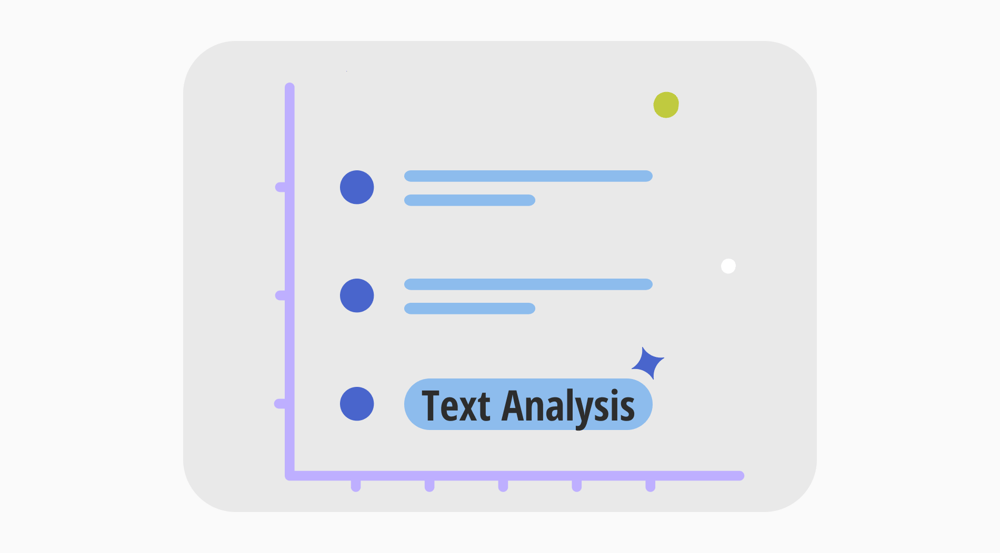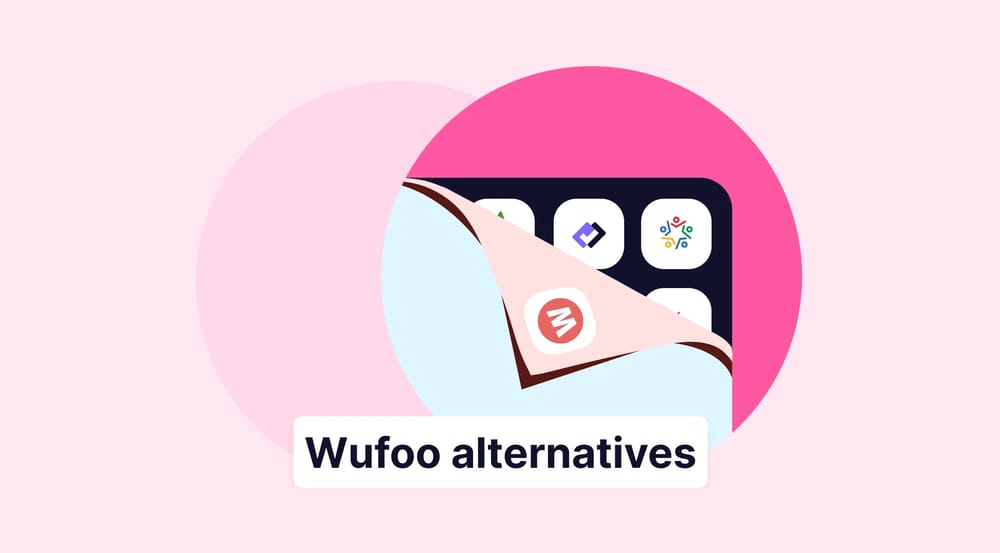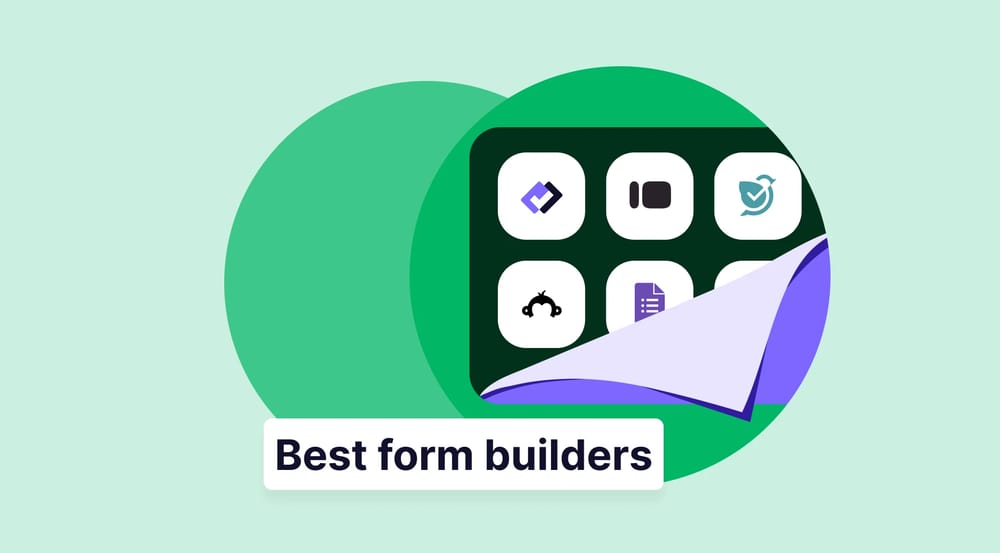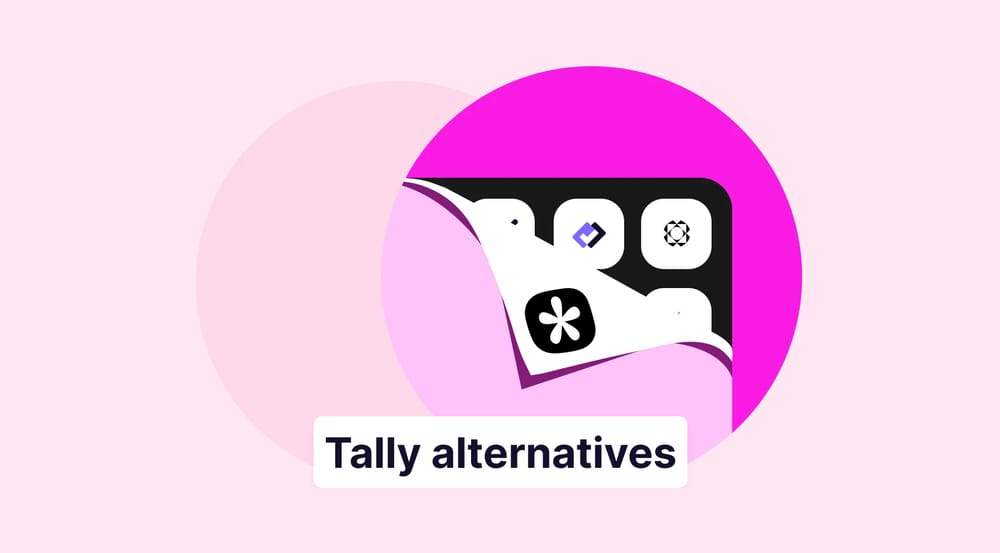Language use or discourse are often tricky processes to decipher. Saying even a simple expression in a different tone or in a different place and time changes the understanding of this expression. Some logical processes, such as context and coherence, can help make sense of this situation, but how do you do this in a long, voluminous text? This is where text analysis comes into play.
Let’s start with the definition
Text analysis (content or textual analysis) is a research method usually supported by artificial intelligence software that finds meanings, patterns, and relationships in any text.
It enables the smooth and systematic classification of incredibly dense and unstructured text data into well-structured ones. It can examine historical or real-time data with qualitative and quantitative techniques and provide definitive evidence for the purpose of the research.
Techniques of the text analysis
In order to carry out your research for more accurate purposes, you may need to choose the appropriate text analysis models and techniques. For example, examining survey answers and examining the transcript of a conversation will not serve the same purposes.
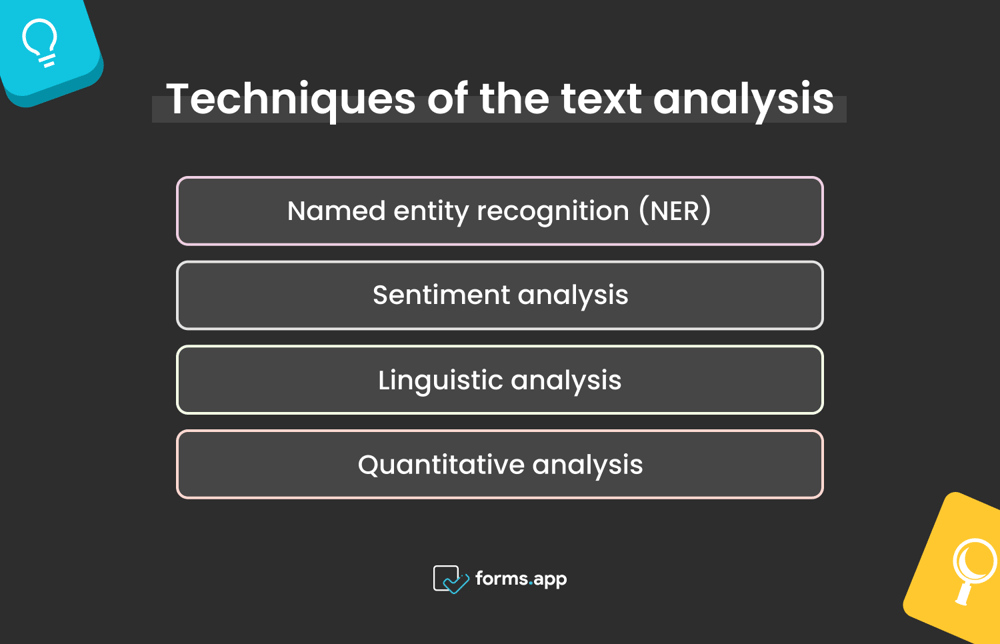
Text analysis techniques
Likewise, an analysis made by businesses to understand their customers is not the same as a linguistic description made for a thesis. You can also use similar analysis methods like content analysis and thematic analysis to identify text data. Here are text analysis examples for each type listed below, from which you can choose the one that suits you:
- Named entity recognition(NER)
This technique is used to analyze a text according to pre-defined categories. For example, you create categories such as proper names, time, and place, and the program you use classifies the expressions that fit these patterns for you.
Example: “It has been 1 year, but this application still does not work in cities other than London.”
Analysis: 1 year(time), cities other than London(location)
This technique is used to identify and extract the emotions of people from any qualitative data. It is generally utilized by businesses to enhance customer satisfaction. There are also ways to do this, such as using a mood scale(1 to 10) or identifying only the dominant emotion.
Example: “I have seen many different TV brands, but this one really made me satisfied while watching it.”
Analysis: Highly positive, satisfaction feeling
- Linguistic analysis
It is a technique that tries to reveal how natural language is used in a text, whether there are grammatical errors, and which functions of the language are used. It is a good method to better understand the relationships and patterns between sentences and to find contextual foundations.
Example: “When you look at the latest movies, they are all good movies.”
Syntactic analysis: The subject is “they,” the verb is “are,” the object is “all good movies,” and the subordinate clause is “when you look at the latest movies.”
Semantic analysis: The sentence expresses a general observation or assertion about the quality of "the latest movies."
- Quantitative analysis
Quantitative analysis is a technique used to examine the patterns of phrases and expressions in a text according to their frequency or to examine numerical data. For this purpose, it is especially appropriate to examine objective data.
Example: You conducted a survey of user comments about a newly released product.
Analysis: When you listed the words that appeared most frequently in the survey responses, you discovered that the words "useful," "affordable," and "good" were the most frequently mentioned.
Text analysis vs. Text mining
First of all, text analysis is a research method, but text mining is a data extraction process. Therefore, it is useful to know that they do not mean the same thing. Text analysis is generally used to find patterns and valuable insights from any text.
This can be used to prove a theory or establish a theory, and the course of the analysis can be shaped accordingly. But text mining is a data mining process. The purpose is only to reveal the data that is not visible, cluster it, classify it, and perform similar operations.
Text analysis as a method for enterprises
In the business world, where any kind of data analysis is worth its weight, it is of great importance to understand what people think and express. You can ensure with a proper analysis that both employees, customers, and the business in general are in a better position. You can use text analysis for this, and why you should use it is listed below:
- It improves customer experience. Businesses can take advantage of customer reviews and personalize their overall experience.
- It is a must for quality product development. By better understanding your customers' preferences, you can develop products and services that meet their needs.
- You can strengthen your marketing and get ahead of your competitors by using business intelligence tools and conducting text analysis.
- Text analysis helps you in risk management. It provides you with data that will enable you to make appropriate decisions for your business by understanding what current and future problems are.
Benefits of the text analysis
The benefits textual data has for businesses are mentioned before. However, it is important to remember that it can be used in all kinds of research activities, not just for businesses. Because text analysis is a guide that will help you when you are lost, it clarifies many questions thanks to the data it reveals. To broaden the benefits examples:
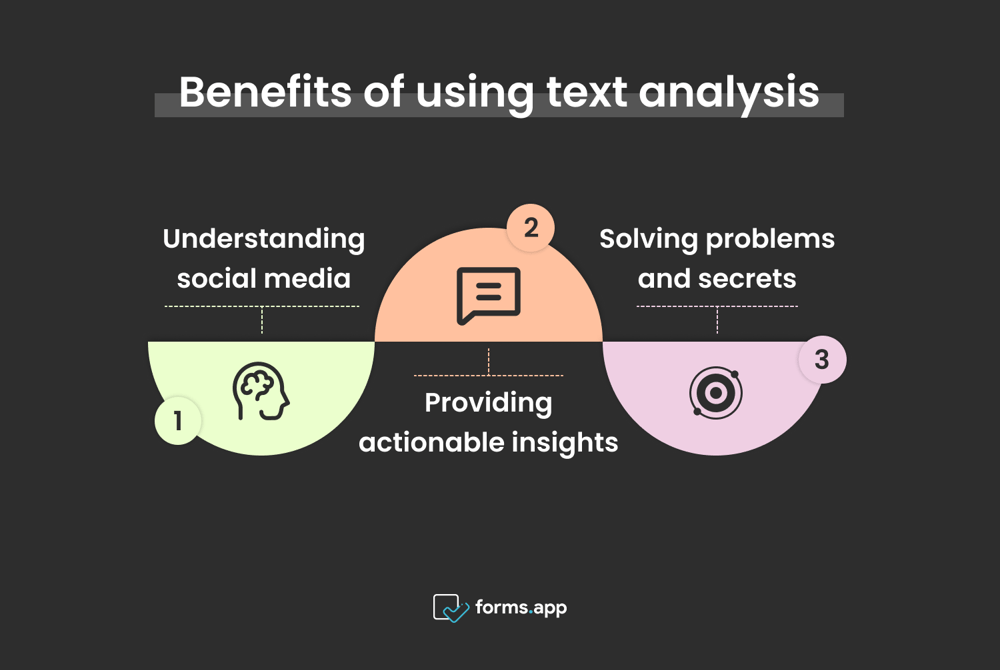
Reasons to use the text analysis
- Understanding social media: There is no limit to the texts that text analysis can examine. Many different texts, from blog posts to news articles, user comments, and social media conversations, serve as data sources for research. Since social media is one of the most powerful tools for communicating with people, you should analyze many different text types as often as possible.
- Providing actionable insights: Like many types of analysis, text analysis provides you with solid data that will enable you to take the necessary steps toward your goal.
- Solving problems and secrets: Text analysis is a method that reveals hidden meanings and patterns in any content. For this reason, machine learning models and AI text analysis will be more useful because they produce more successful and error-free results than text analysis conducted by humans.
Text analysis tools
There are many different text analysis software and tools that researchers can use depending on their needs and competence. Here just the popular ones are listed below:
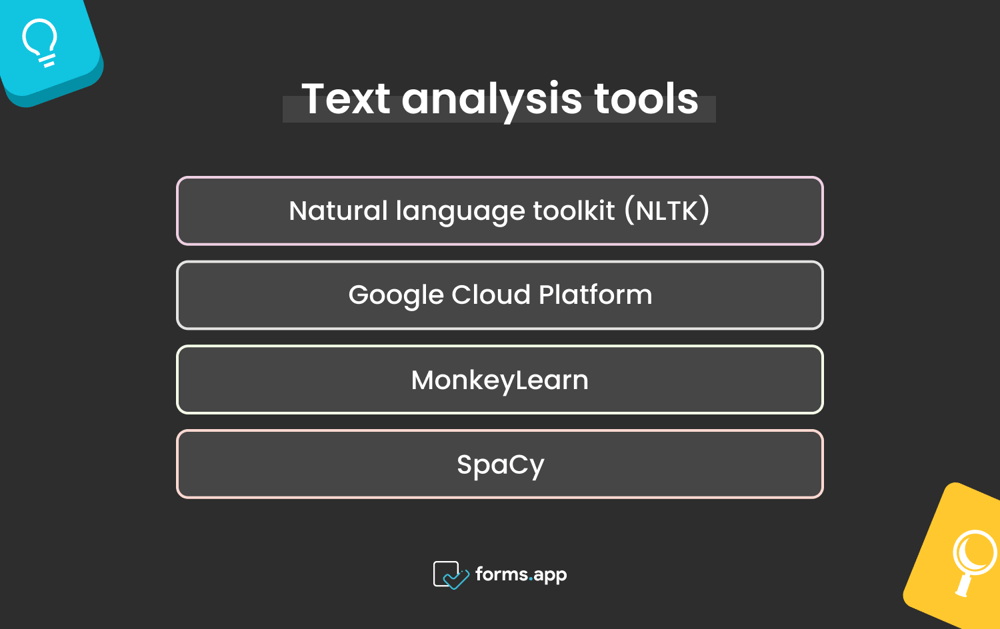
Tools for text analysis
- Natural language toolkit(NLTK): NLTK is a Python library that you can use in text analysis. It makes your analysis easier with the many different tools it provides.
- Google Cloud Platform: Thanks to Google’s NLP tool, you can easily perform many text analysis techniques, from sentiment analysis to linguistic analysis.
- MonkeyLearn: MonkeyLearn is a valuable tool that allows you to perform analyses without writing code, thanks to its user-friendly interface and the models and integrations it provides.
- SpaCy: This is another Python library you can use in text analysis. It is especially preferred over the others due to its ease of use and performance.
Frequently asked questions about the text analysis
In this FAQ section, you can easily access the parts about text analysis that you and other readers are curious about.
For example, text analysis is a critical tool for advertising. Analyzing social media comments, search history, and similar cookie-based texts in any digital environment is of great importance in continuing advertising activities.
If you want to know how to write text analysis, you must first understand the main elements of the research text, such as themes and patterns. This is possible with both a proper analysis and the evaluation of a qualified researcher.
Then, opinions and evaluations related to the subject are put forward through evidence and examples from the text. Finally, an advisory insight is presented by stating the primary purpose and summary of the analysis.
In text type analysis, it is determined which genre a text belongs to and which language patterns it has. This allows researchers to understand the structures with which different text types emerge and how they are used in communication.
Yes, text analysis is a research method for analyzing any written or transcripted oral language to obtain useful information. However, there isn't one way to do this, and it involves many other research types.
Text analysis is a research method that allows the use of not only qualitative data but also quantitative data. Depending on the purpose of the research questions, the focus may be qualitative or quantitative, or it is possible to use both consecutively.
In linguistics, text analysis is used to understand the function of a language, discourse, and communication. Text is examined in different dimensions according to its sub-branches of linguistics. While the characteristics of sounds are important in phonological text analysis, the construction rules of words are investigated in a morphological analysis.
Apart from this, syntactic analysis is carried out in the sentence dimension, semantic analysis in the meaning dimension, pragmatic analysis in the language use, and discourse analysis in the large-scale speech dimension.
Text analysis and sentiment analysis are both used in natural language processing (NLP). Sentiment analysis is a subcategory of text analysis. It is especially used to evaluate and score the prevailing emotional state in a text.
It is generally utilized by businesses and organizations to better understand the feelings and thoughts of customers and the public. However, text analysis is generally used to reveal concepts, expressions, and structures in a text, and its focus is broader than the examination of emotions.
Text analysis and document analysis are two different methods that are related to each other but have different purposes. The main difference between document analysis and text analysis is that the former is used to examine the structure of large-scale texts, while the latter is used to examine an individual text.
The size of this individual text may also be quite large, but text analysis tries to understand the essence of the patterns and expressions in this text. On the other hand, document analysis is used to classify and summarize the document by structurally examining all elements inside and outside of the text.
Final words
In conclusion, the purpose of this article is to introduce you to text analysis and make you a competent individual in this type of analysis. Therefore, first of all, the introduction was made with the definition of text analysis. Then, the techniques you could use were explained. Since it is often confused with text mining, its differences were mentioned.
The benefits for businesses and anyone wanting to do general research are listed. Finally, the article ended by mentioning the software tools with which you can analyze text. After that, all you have to do is start creating a custom text analysis.
forms.app, your free form builder
- Unlimited views
- Unlimited questions
- Unlimited notifications

